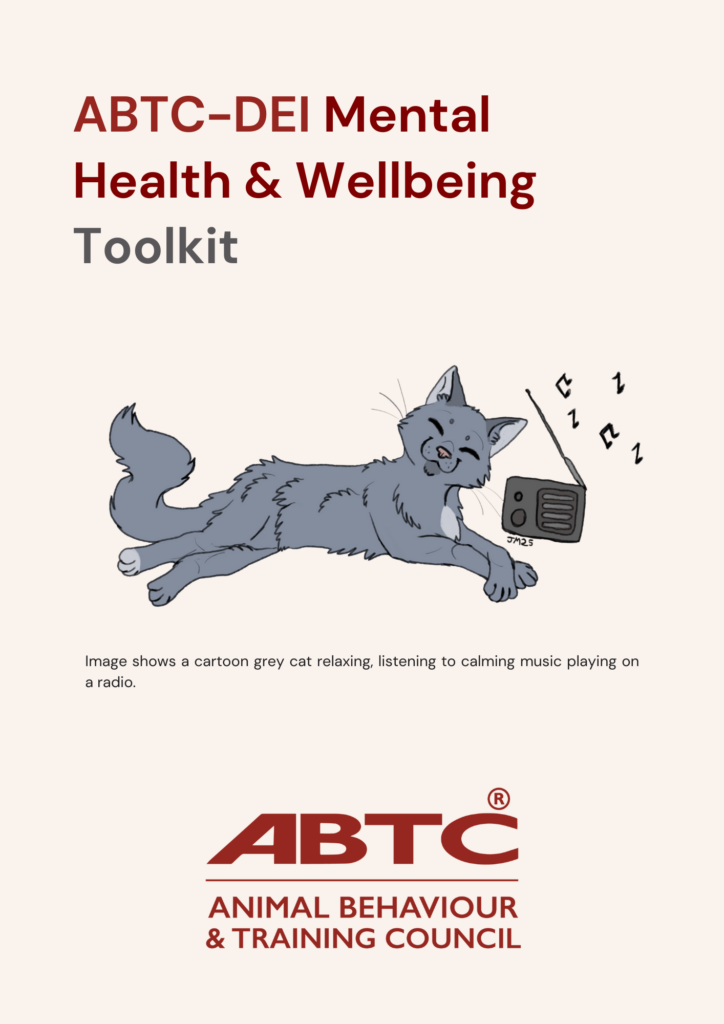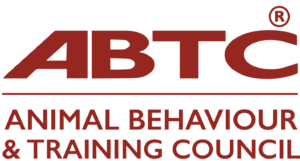Upcoming CPD:
Tea & Learn with Dr Zazie Todd – Strategies for the Human Side of Dealing with Pet Behaviour Issues
For ABTC practitioners and members
We’re delighted to announce a special Tea & Learn CPD session for all ABTC Registered Practitioners and Member Organisations on Tuesday 8th July at 5pm (BST) via Zoom.
This event features Dr Zazie Todd, ABTC Patron, author of Wag: The Science of Making Your Dog Happy and Purr: The Science of Making Your Cat Happy, and the founder of Companion Animal Psychology.
Zazie will explore the emotional and cognitive challenges faced by guardians of pets with behaviour issues, drawing on the latest research in human psychology and animal behaviour. When dogs and cats struggle, so do their people – and our role as professionals often requires supporting both ends of the lead.
What the session will cover:
- The role of confidence and emotions in human guardians
- Understanding caregiver burden in the context of pet behaviour
- Strategies to help guardians learn from difficult experiences
- Coaching methods that are inclusive, structured, and supportive
- The relationship between emotional stress and the likelihood of using humane training methods
This is a short-format session, lasting around 30/40 minutes with a live Q&A to follow. It’s designed to offer practical insights that you can immediately take into your client work.
- In person places are now full. If you would like to receive a recording of the session, please email the ABTC office at admin@abtc.org.uk with your name and organisation
June 2025
ABTC Lunch & Learn: A New DEI-Focused Series Begins
We’re pleased to announce the first in a new series of Diversity, Equity and Inclusion (DEI) themed Lunch & Learn sessions, hosted by the ABTC-DEI Working Party. This event will take place live via Zoom on Tuesday, 24 June at 12.30 pm (BST), and is open to all ABTC registered practitioners and member organisations.
The session will introduce key DEI themes relevant to our sector, including:
- The broad scope of DEI and its relevance to our work
- Common challenges and barriers
- Meaningful actions individuals and organisations can take
This Lunch & Learn forms part of our free CPD programme for practitioners and member organisations and will be followed by further DEI sessions across the year, each offering a chance to reflect, learn, and act.
To attend, please email admin@abtc.org.uk with your full name and the member organisation you belong to or work/volunteer with to register and receive the Zoom login link.
We look forward to welcoming you to the session – sandwiches are optional!
June 2025
ABTC Gazette
If you scroll to the bottom of this page you will see a list of newsletters that have been published by ABTC.
The latest ‘Gazette’ can be found here
May 2025
Message from the ABTC DEI Working Party – May 2025
The ABTC Diversity, Equity & Inclusion Working Group would like to share a message at this time to all our member organisations and practitioners, as well as the wider community.
As part of our aim to promote ethics and welfare and increase standards within the animal training and behaviour sector, we would like to again highlight the importance of upholding the values of Diversity, Equity, and Inclusion. Please click here to read the DEI Working Party’s message.
Introducing our Mental Health & Wellbeing Toolkit
The ABTC are committed to improving diversity, equity, and inclusivity within our own organisation, and throughout the animal welfare and training sphere. We recently surveyed our practitioners to better understand their experiences and or any challenges they faced. A significant number of respondents reported having a disability, with physical, long-term, and mental health conditions being the most commonly reported. This indicates the need for better support and accommodations, including reviewing support around mental health and promoting wellbeing across the sector. In response to these findings, the ABTC DEI Working Party have produced a Mental Health & Wellbeing Toolkit .
Professionals in the animal behaviour and training sector face unique and complex challenges, with many individuals in this field vulnerable to high levels of burnout, often due to the demands of working on emotive animal cases. Practitioners frequently encounter cases involving difficult decisions and must balance the expectations of clients with the wellbeing of the animals they support. These emotionally charged situations can understandably be overwhelming and lead to feelings of stress. This toolkit has been carefully put together to address these challenges, offering a variety of practical strategies and recommended resources for managing stress, enhancing resilience, and prioritising self-care. With dedicated sections on physical health, sleep, nutrition, mindfulness, peer networks and work and productivity, we aim to support practitioners’ mental health and wellbeing and help promote a healthier, more inclusive environment for everyone in the sector. We hope you find this guide helpful and welcome your feedback. Click here to access the Mental Health & Wellbeing Toolkit
Note: This Toolkit is for informational purposes only and not a substitute for medical advice. If you are undergoing treatment or have any health concerns, please consult your GP or healthcare provider before following any guidance in this toolkit.
Discover the new ABTC shop!
We often get asked for ABTC branded clothing, so that people can show their support for the charity. Trustees listened and have set up a shop to offer exactly that. We thought you might like notepads or even tea/coffee mugs, so are offering those as well.
In keeping with ABTC’s values the clothes are crafted from certified organic cotton, recycled materials and ethically sourced fabrics ensuring they are as kind to the planet as they are to the animals we work to protect.
You will find a blog explaining in more detail here and the full shop here. You will also find a tab in the page menu at the top of the website so you can pop in any time you would like to treat yourself

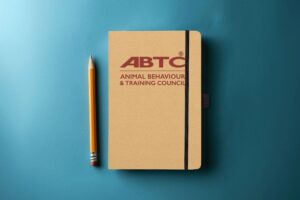 .
.
Shop sustainable clothing and eco-friendly accessories. Every purchase helps fund ABTC’s vital work. Wear your values today!
Zazie Todd becomes Patron of ABTC
The Animal Behaviour and Training Council (ABTC) is thrilled to announce that Zazie Todd, PhD, renowned animal behaviour expert and award-winning author, has joined the organisation as a Patron. This marks an inspiring collaboration in advancing ethical, science-led practices in animal behaviour and training.
Zazie Todd is widely respected for her contributions to the field of animal behaviour and training. She is the author of the bestselling books Wag: The Science of Making Your Dog Happy, Purr: The Science of Making Your Cat Happy, and the recently released Bark! The Science of Helping Your Anxious, Fearful, or Reactive Dog. Zazie is also the creator of the popular blog Companion Animal Psychology and a regular columnist at Psychology Today – helping to make complex behavioural science accessible and impactful for a global audience.
For more details please click here
ABTC Programme Recognition for Course Providers
Are you a course provider?
Gaining recognition through the ABTC Programme is a mark of excellence for education providers in the animal behaviour and training sector. Approval demonstrates that your courses meet the rigorous standards set by industry professionals, ensuring quality and credibility. By achieving ABTC approval
- You enhance your institution’s reputation
- Attract dedicated students, and
- Align with the UK’s leading authority in animal welfare and training
Don’t miss the opportunity to showcase your commitment to the highest standards in education and professional development. Learn more at https://abtc.org.uk/education/
ABTC Statement on the LIFE Model
We at the Animal Behaviour and Training Council (ABTC) are dedicated to promoting the highest standards of animal welfare. Dr Eduardo Fernandez’s recent paper on the LIFE Model (Least Inhibitive Functionally Effective) offers a comprehensive approach to companion animal welfare and provides valuable insights into enhancing our practices.
Please click here for the full statement
ABTC Statement on recent study concerning the use of Shock Collars in dog training
The recent publication of the study titled Comparison of the Efficacy and Welfare of Different Training Methods in Stopping Chasing Behavior in Dogs (Johnson and Wynne, 2024) has sparked significant debate across the animal welfare community. This study, which adds to the growing body of evidence on the adverse effects of shock collars (e-collars), highlights serious concerns regarding the welfare of dogs subjected to this training method. It is important that we take such findings seriously while maintaining a critical eye on the methodology and limitations of any research.
We recognise the importance of science in advancing our understanding of animal behaviour and welfare. Science, however, is always evolving, and what this new study has shown is that e-collars cause pain. There is robust research that highlights we do not need to hurt dogs, cause pain or fear to train them and train them well. We know positive approaches are effective.
We encourage all professionals working with animals to engage with such research critically and keep the welfare of the animals at the forefront of their practices.
The ABTC’s position remains clear: there is never a need to resort to methods that cause harm or distress in order to effectively train dogs. Modern, science-based approaches – grounded in positive reinforcement – have been consistently shown to produce effective, long-term results without inflicting pain or fear. As a sector, it is our responsibility to promote humane and ethical practices that safeguard the well-being of animals in our care.
Collaboration across the sector is key to ensuring that trainers and behaviourists are well-informed and skilled in humane techniques. The ABTC is committed to supporting this by providing clear standards of competence and knowledge for those working with animals. By continuing to work together, we can ensure that all training and behaviour practices reflect the latest advancements in animal welfare science and ethics.
In light of these concerns, the ABTC firmly believes that the sale and use of shock collars should be banned in England. We urge policymakers, trainers, and guardians alike to prioritise the well-being of dogs by embracing humane, evidence-based training methods that avoid pain and fear.
For further information, please see Ban the use of shock collars | Campaigns | RSPCA – RSPCA – rspca.org.uk
Accessibility on the ABTC website
The Animal Behaviour & Training Council (ABTC) is pleased to announce the launch of its new Accessibility function, aimed at improving the online experience for all users. This upgrade aligns with the ABTC’s commitment to making vital information and resources easier to access for both animal guardians and professionals working in animal behaviour and training.
The newly introduced features are designed to improve navigation and ensure that everyone can use the website with greater ease. Whether users are seeking advice on animal behaviour, looking for a registered ABTC practitioner, or wanting to learn more about what the ABTC does, the website is now more accessible and user-friendly.
“We’re proud of the progress we’ve made, and we understand that accessibility is an ongoing effort,” said Hanne Grice, ABTC Trustee and DEI Working Party Chair. “This update is an important step, and we’re committed to continually improving the website to meet the diverse needs of our community.”
The ABTC invites visitors to explore the new Accessibility features at abtc.org.uk and looks forward to future developments that will further enhance the user experience.
Just click on the icon at the right-hand side of the page and you will see the different accessibility tools. The video below will show you more.
IMPORTANT INFORMATION re CHANGES TO APPLICATION PROCEDURE
Please note that the current APEL process is changing. From Monday 21 October 2024 all applicants will apply directly to the ABTC rather than via a Practitioner Organisation.
Moving forward the APEL assessment will also include up to three oral interviews in addition to a review of the written evidence. This process allows applicants the best possible opportunity to demonstrate their Knowledge and Understanding. Due to these changes, the cost to applicants will be increasing to £325 to cover both assessors time and administration costs carried out by the ABTC.
Anyone who has applied for APEL before 31st August 2024 will continue in the current process.
However, we kindly ask that if you want to apply on or after 1 September 2024 that you email Helen – the ABTC assessment administrator – on assessments@abtc.org.uk to register your interest in applying under the new system when it comes into effect at the end of October 2024.
This page will be updated with further details over the next couple of months, so please watch this space.
We look forward to welcoming your APEL application very soon.
ABTC Statement on Augusto Deoliveira’s Dog Handling Practices
ABTC member RSPCA has had a statement from Mr Deoliveira (commonly known as ‘The Dog Daddy’) shared with them, which claims that he is planning on visiting the UK very shortly.
We are deeply concerned about the dog handling practices he demonstrates, and would strongly advise pet carers to approach his teachings with extreme caution and to consider the potential harm that could arise from implementing his techniques.
Dr Sam Gaines (RSPCA) spoke to BBC West Midlands about their concerns. This is the link to the recording, the segment is at 1 hour 18 minutes.
ABTC’s statement regarding his methods can be found here
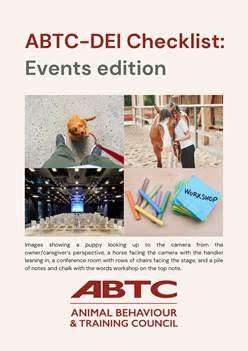
We are delighted to introduce our new
Event Checklist!
Ensuring inclusivity and accessibility in events hosted by ABTC member organisations and practitioners is crucial for creating welcoming and supportive environments for all participants. So, we are delighted to introduce our new Event Checklist! This latest edition builds on our Inclusivity Guide, launched earlier this year, and is aimed at helping ABTC member organisations and practitioners create inclusive and accessible events.
Whether you’re organising group classes, conferences, workshops, or other events, this checklist provides practical guidance for selecting venues and other considerations to ensure you cater to diverse needs and abilities. We hope you find this new edition helpful and welcome your feedback.
𝗘𝘅𝗰𝗶𝘁𝗶𝗻𝗴 𝗻𝗲𝘄𝘀 𝗳𝗼𝗿 𝗕𝗦𝗟 𝗨𝘀𝗲𝗿𝘀
The Animal Behaviour & Training Council (ABTC) is thrilled to announce a new service for our British Sign Language (BSL) users. Whether you’re seeking behaviour or training help for your animal or you’re an ABTC registered practitioner, we’ve got you covered!
🛈 For Animal Carers: If you’re a BSL user looking for training or behaviour support for your animal, we’ve made it easier and more accessible. ABTC practitioners can now arrange for a BSL video interpreter to join your training or behavioural sessions, ensuring clear communication and understanding. This service is available for both in-person and online appointments.
To find registered ABTC practitioners near you, visit our Practitioner Directory at
https://abtc.org.uk/practitioners/
🛈 For ABTC Practitioners: Registered ABTC practitioners who are BSL users or work with BSL clients, we’re here to support you too! Through our partnership with Sign Solutions, you can access BSL video interpreters for your training or behaviour appointments. This service includes both pre-booked appointments with your clients, and on-demand virtual signing support, making your sessions more inclusive and effective.
The ABTC believes in fostering inclusivity within the animal behaviour and training sector. This new service is a significant step towards ensuring that everyone, regardless of language, can access the best care and support for their animal companions.
Find out more about this service and how to access it on our website
– For BSL animal carers https://abtc.org.uk/bsl-owners/
– For ABTC registered practitioners https://abtc.org.uk/bsl-practitioners/
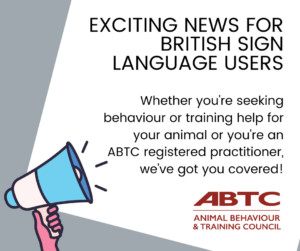
Response to CCAB Certification Ltd dated 19 December 2023
The recent communication from CCAB Certification Ltd dated 19 December has come to the attention of the Trustees. We wish to address several key issues raised therein, particularly concerning our relationship with ASAB Acc and the broader implications for the animal behaviour and training sector.
Read the full response here

 Happy Holidays and a Joyous New Year!
Happy Holidays and a Joyous New Year! 

The ABTC extends our warmest wishes to all our valued followers and supporters. Whether you’re celebrating Christmas, enjoying other holiday traditions, or simply relishing the spirit of this season, we hope these days are filled with peace, joy, and love for you and your loved ones.
We also want to take this opportunity to thank you for your support throughout this year; it is thanks to your support we continue to drive our goal to set and maintain the highest standards in the animal behaviour and training sector. As we step into the new year, we remain dedicated to fostering diversity, inclusivity, accessibility, and professional integrity in all that we do. Our focus is unwavering: to unite the animal behaviour and training sector, working with the veterinary community. Together, we continue to focus on our collective aim to improve animal welfare, by ensuring that every animal undergoing training and behaviour therapy, as well as their caregivers, receive the highest standard of support.
ABTC recognises and celebrates the rich tapestry of religious views, backgrounds, and cultures that make up our incredible animal behaviour and training community. In this season of goodwill, let’s remember the beauty of our diversity and the strength it brings to our collective aim, and be united. Together, we can make a difference in the lives of animals and those who care for them.
Thank you for being a part of our journey. Here’s to a prosperous, fulfilling, and impactful 2024!
𝗟𝗲𝘁’𝘀 𝗺𝗮𝗸𝗲 𝘁𝗵𝗶𝘀 𝗖𝗵𝗿𝗶𝘀𝘁𝗺𝗮𝘀 𝗮 𝘁𝘂𝗿𝗻𝗶𝗻𝗴 𝗽𝗼𝗶𝗻𝘁 𝗳𝗼𝗿 𝗮𝗻𝗶𝗺𝗮𝗹 𝘄𝗲𝗹𝗳𝗮𝗿𝗲!
As we approach the festive season, a time of giving and reflection, we at the Animal Behaviour and Training Council (ABTC) are reaching out to our valued supporters with a heartfelt appeal. The post-COVID-19 era has ushered in unprecedented challenges and opportunities in the field of animal behaviour and training. With a significant rise in animal ownership across various species, we’ve witnessed an increased demand for behavioural and training support and, sadly, a surge in animal relinquishment. Couple with other challenges for caregivers, now more than ever, the public needs the expertise and guidance of knowledgeable trainers, behaviour therapists, and expert witnesses.
Your contribution can make a huge difference
Imagine the impact if our valued supporters could contribute. Even a small donation, as little as £1, can collectively amount to several thousand pounds. This significant sum can drive our UKAS accreditation project forward, marking a substantial step toward improved animal welfare.
How to donate
Donating is simple and takes only a moment, but the impact of your gift will resonate far beyond this festive season. To make your donation, please visit https://abtc.org.uk/donations/ or contact us at info@abtc.org.uk for more information on how to contribute.
Thank you for considering this appeal. Your support means the world to us and the countless animals and their carers that benefit from our collective expertise and care.
Warm regards, ABTC Trustees
Read more here
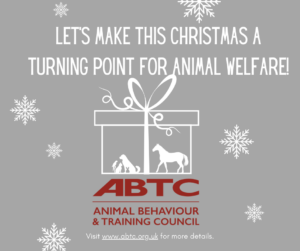
ABTC responds to the Government’s ban on XL Bully type dogs
While action must be taken to protect people and other animals from dangerously out of control dogs, the ABTC disagrees with the continued focus on specific breeds and types rather than a focus on the most significant factors that result in dogs that are out of control and exhibiting behaviour that is dangerous.
Please read full response here
Statement from ABTC regarding complaints received
The ABTC takes every complaint that comes to us from our practitioners, practitioners’ clients, member organisations, and others outside of our member organisations, seriously. Every communication we receive via email or social media channels is responded to; no one is ignored.
You can read the full statement here
BVNA Congress 2023
ABTC Advisory Member, British Veterinary Nursing Association (BVNA) held their annual congress in Telford from 6 – 8 October this year. Celebrating their 50th year, with the theme ‘Empowerment’, this landmark event and high calibre speakers provided opportunities for learning, exploring and connecting with fellow attendees. Championing the veterinary nursing profession, this progressive organisation espouses ‘human and animal welfare’ as a core value. The ABTC was proud to attend the event as an exhibitor and thrilled to support ABTC Trustee, Nikki McLeod as a congress speaker. Read more ..
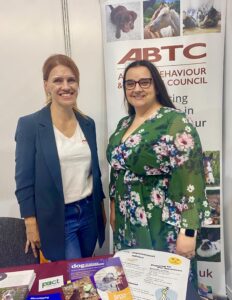
Statement on Augusto Deoliveira’s dog handling practices
The Animal Behaviour and Training Council (ABTC) wishes to express its deep concern of the dog handling practices demonstrated by Augusto Deoliveira, commonly known as the “Dog Daddy”.
You can read the statement here
Shock collars
‘Shock collars cause pain to the animal as part of the training process. The Animal Behaviour and Training Council believes deliberately causing pain is both ethically wrong and ineffective as a means of training an animal when training by reward is both more effective and kinder. We fully support the proposed ban on their sale and use’ Chris Laurence, ABTC Trustee
Please see ABTC’s statement on shock collars here
ABTC Member RSPCA have a call to action to ‘Ban the use of shock collars’
The PAW Report
The PDSA Animal Wellbeing (PAW) Report is the UK’s largest annual assessment of pet wellbeing.
When the PAW Report launched in 2011, it became the first overarching means of identifying, assessing and monitoring the wellbeing of companion animals and how well their 5 Welfare Needs are being met. While the introduction of the Animal Welfare Acts in 2006 placed a legal ‘duty of care’ for all pet owners to meet their pet’s Welfare Needs, there was no accompanying Government surveillance, and therefore, before the PAW Report, no means of knowing if this was being achieved on a nationwide scale.
Each year PDSA works with leading market research company, YouGov, to survey nationally representative samples of pet dog, cat and rabbit owners, providing insight into animal welfare issues, estimating pet population numbers, and understanding how people care for their pets. In 2023, as in previous years, we also surveyed veterinary professionals to gather their thoughts and opinions about key welfare issues.
The PAW Report can be found here
ABTC
Please click on this statement for details on Ensuring Consistency of Practitioner Standards
UKAS
UKAS is the National Accreditation Body for the United Kingdom. They are appointed by government, to assess and accredit organisations that provide services including certification, testing, inspection and calibration.
At a special meeting of the Council it was agreed that ABTC should make an application to UKAS for accreditation. This marks a significant step forward in the drive to establish ABTC as the animal behaviour and training sector regulator as UKAS accreditation is an important element in government recognition.
Trustees have been working hard to prepare for this moment and although it will be a lengthy and detailed process, there is a determination to succeed. Arrangements are now being made for the preliminary inspection which is expected to happen early in the new year.

ABTC are now members of NEWC (National Equine Welfare Council)
NEWC was formed in 1977 and its mission is to protect the welfare of the horse, pony, donkey and mule by ensuring that everyone who has an interest or association with an equine makes its health and welfare the overriding factor in all decision making.
If you would like to find out more about NEWC their website is https://newc.co.uk/
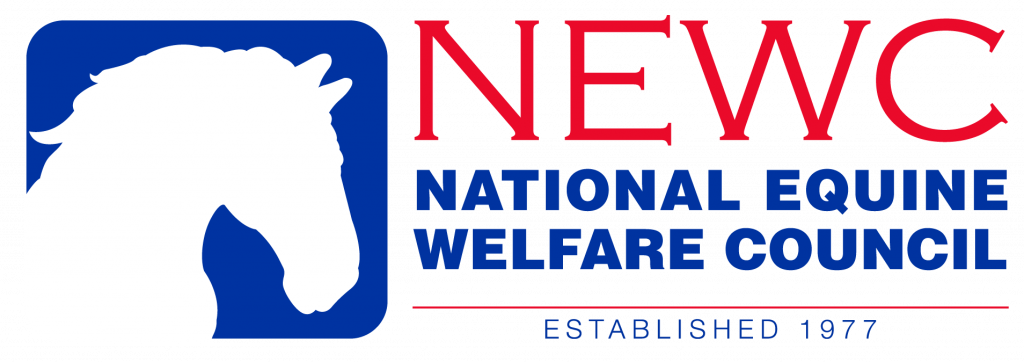
ABTC Newsletters
ABTC issues a Newsletter twice a year. If you would like to read them, please click the links below.
Please be aware that we no longer send newsletters by email, but they will continue to be available on this page.
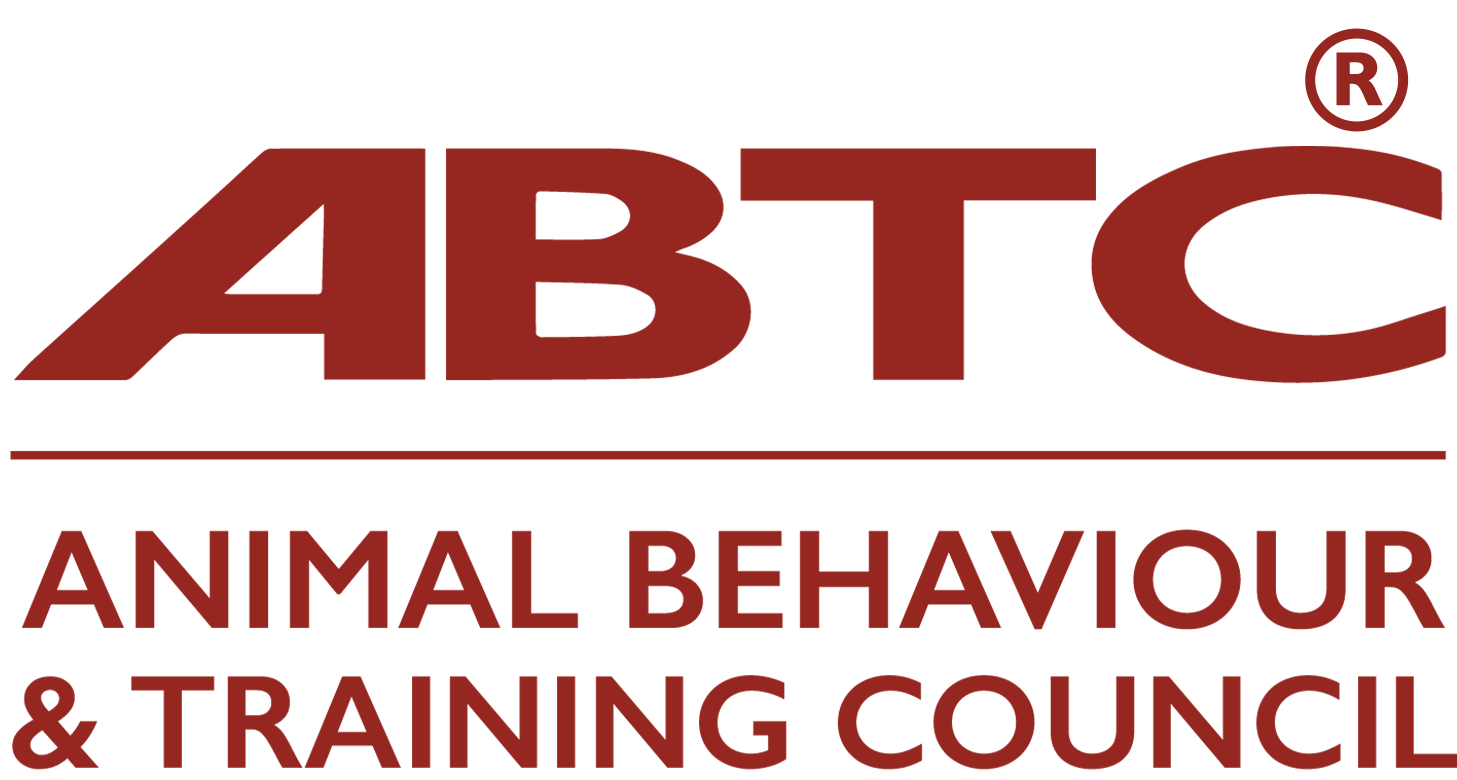
![Alt text: Graphic promoting ABTC’s free “Tea & Learn” webinar on pet behaviour’s impact on guardians, featuring speaker Zazie Todd. Details: Tuesday 8 July, 5 pm BST, one hour session with Q&A. Register via admin@abtc.org.uk.]](https://abtc.org.uk/wp-content/uploads/2025/06/Zazie-Todd-8.7.25-image-300x300.png)
